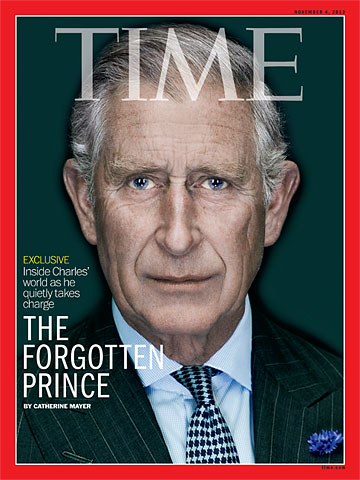
(5 of 8)
But it was Christopher Soames, a politician and diplomat, who alerted the Prince to the life-changing secret of his royal superpower. Soames pointed out that few people reject an invitation to meet the heir to the throne, especially if a fancy dinner and highfalutin guests are added to the mix. In the four decades since that revelation, the Prince has used his unparalleled convening power to summon many of the world's wealthiest to his table, expertly extracting some of their wealth to fund his charitable endeavors. (Such guests are known as "Bond villains" among mischievous members of his household.) He has taken captains of industry to some of the poorest corners of the kingdom and, in his words, brought together "businesspeople, government and agencies to sit down with NGOs, who normally they might never have talked to, except they shout across a huge chasm."
An April 2009 photograph taken at St. James's Palace, part of the complex with Clarence House that forms his London home, captures a summit of the Prince and eight elected leaders--Australia's Kevin Rudd, France's Nicolas Sarkozy, Germany's Angela Merkel, Guyana's Samuel Hinds, Indonesia's Susilo Bambang Yudhoyono, Italy's Silvio Berlusconi, Japan's Taro Aso and Norway's Jens Stoltenberg--as well as U.S. Secretary of State Hillary Clinton, four British Cabinet ministers, some nonelected leaders and the heads of international institutions. Convened by the Prince to float the idea of emergency funding to protect rain forests by making them more valuable alive than dead, the meeting sparked an intergovernmental process that the following year created a $6.4 billion fund to help rain-forest countries.
These days, only four of the 13 participating politicians hold office, but the Prince still plugs away at the issue through his think tank, the International Sustainability Unit, which also seeks solutions to such challenges as creating food and water security. That might seem like a thoroughly good thing, but it speaks to a central reason the Prince remains a controversial figure. He cannot be ousted by voters.
About a quarter of Britons will never accept the hereditary principle of monarchy. British republicans see the monarchy as a source and guarantor of the nation's entrenched inequalities, even if Prince Charles does more than a little good for the victims of those inequalities. Republicans in Commonwealth countries resent their royal hangover from the days of the British Empire. "Camilla, whom I've met, is very amiable and talks fair dinkum talk," e-mails Schindler's Ark author Thomas Keneally, an Australian. But "amiability does not mean, any more than arrogance, that a British head of state should be our head of state."
